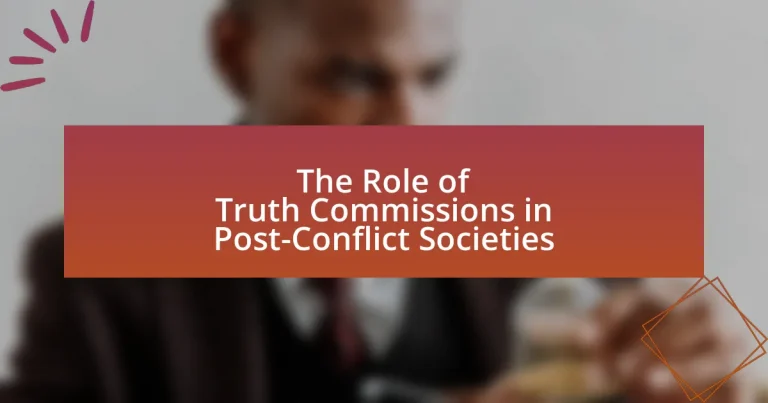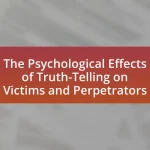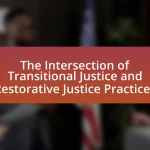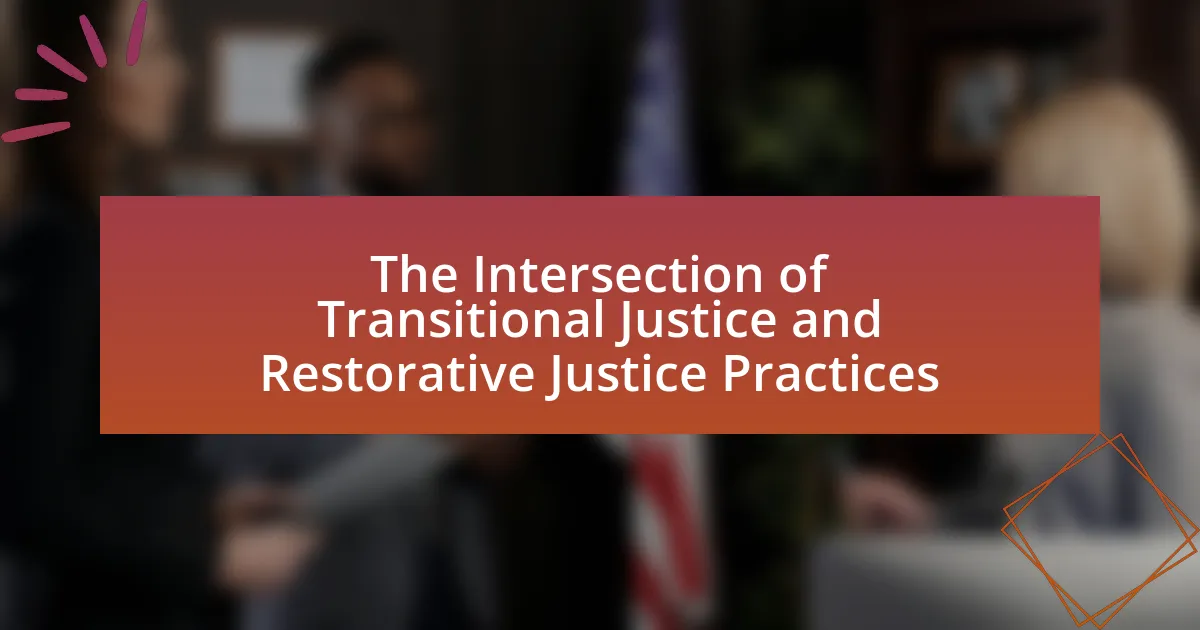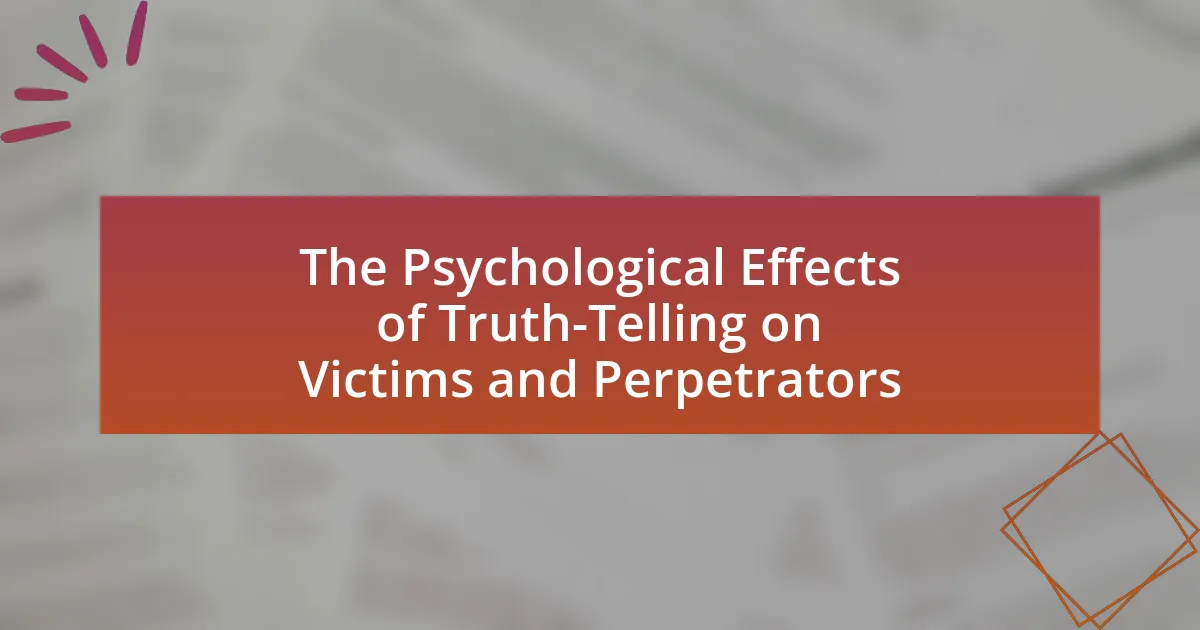Truth commissions are official bodies established to investigate and document human rights violations in post-conflict societies, aiming to promote reconciliation, establish historical records, and provide platforms for victims to share their experiences. This article explores the functions of truth commissions in fostering dialogue and accountability, the processes involved in their establishment, and the methodologies used to gather testimonies. It also addresses the psychological impacts on victims and perpetrators, the challenges faced in implementation, and the roles of various stakeholders, including government entities and civil society. Additionally, the article discusses best practices for enhancing the effectiveness of truth commissions and their implications for preventing future atrocities and informing conflict resolution efforts.
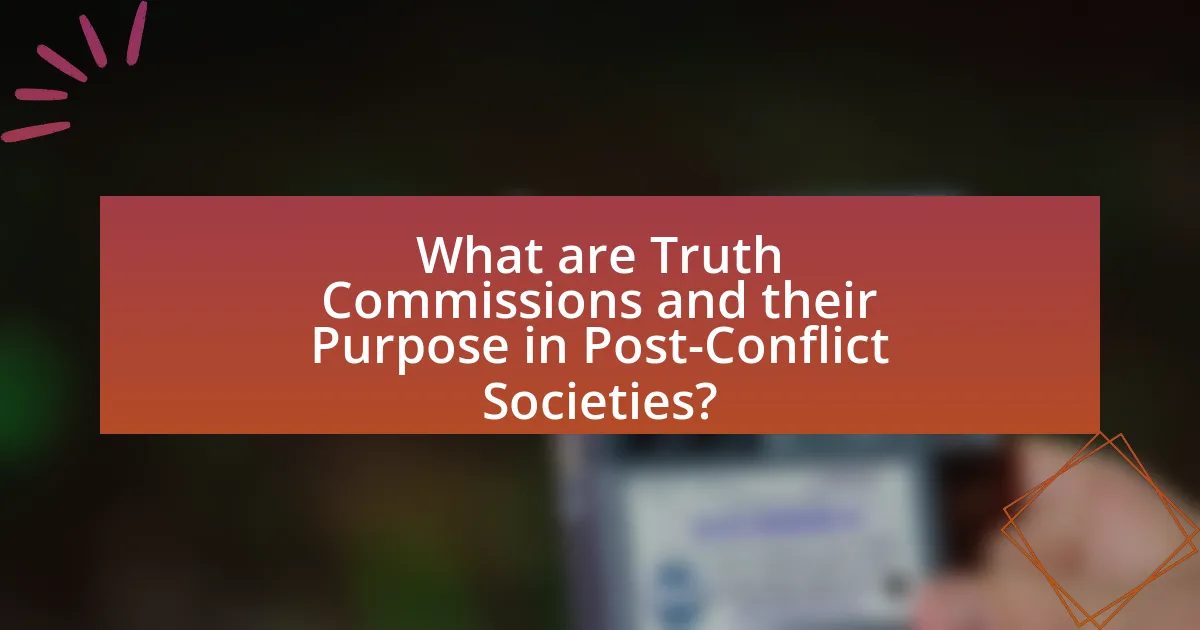
What are Truth Commissions and their Purpose in Post-Conflict Societies?
Truth commissions are official bodies established to investigate and document human rights violations and atrocities that occurred during periods of conflict or authoritarian rule. Their primary purpose in post-conflict societies is to promote reconciliation, establish a historical record, and provide a platform for victims to share their experiences, thereby fostering healing and preventing future violence. For instance, the South African Truth and Reconciliation Commission, established in 1995, aimed to address the injustices of apartheid by uncovering the truth about past abuses, which helped to facilitate national healing and build a more democratic society.
How do Truth Commissions function in the context of reconciliation?
Truth Commissions function in the context of reconciliation by investigating and documenting human rights violations, fostering dialogue, and promoting accountability. These commissions aim to uncover the truth about past atrocities, which helps to acknowledge victims’ suffering and validate their experiences. For example, the South African Truth and Reconciliation Commission, established in 1995, played a crucial role in addressing the injustices of apartheid by allowing victims to share their stories and perpetrators to confess their crimes, thereby facilitating a collective healing process. This approach not only aids in restoring trust among communities but also lays the groundwork for legal and social reforms, contributing to long-term peace and stability in post-conflict societies.
What processes are involved in the establishment of a Truth Commission?
The establishment of a Truth Commission involves several key processes, including the mandate creation, stakeholder engagement, and operational setup. Initially, a government or relevant authority defines the commission’s mandate, outlining its objectives, scope, and duration, often influenced by the specific context of the post-conflict society. Following this, stakeholder engagement occurs, where input from victims, civil society, and other relevant groups is gathered to ensure the commission addresses the community’s needs and concerns. Finally, the operational setup includes appointing commissioners, establishing a framework for investigations, and securing necessary resources to facilitate the commission’s work. These processes are critical for ensuring the commission’s legitimacy and effectiveness in addressing past human rights violations and fostering reconciliation.
How do Truth Commissions gather and document testimonies?
Truth Commissions gather and document testimonies through structured interviews, public hearings, and written submissions. These processes allow individuals affected by conflict to share their experiences in a safe environment, often facilitated by trained personnel who ensure confidentiality and sensitivity. For example, the South African Truth and Reconciliation Commission utilized both public hearings and private testimonies to collect over 21,000 statements from victims and perpetrators, which were then meticulously recorded and analyzed to create a comprehensive historical account of human rights violations. This method not only preserves individual narratives but also contributes to collective memory and accountability in post-conflict societies.
Why are Truth Commissions considered essential for healing?
Truth Commissions are considered essential for healing because they provide a structured process for acknowledging past atrocities and fostering reconciliation. By facilitating open dialogue about human rights violations, these commissions help victims share their experiences, which is crucial for personal and collective healing. For instance, the South African Truth and Reconciliation Commission, established in 1995, allowed victims to recount their stories, contributing to national healing and understanding. This process not only validates the suffering of individuals but also promotes accountability and prevents future violations by documenting the truth.
What psychological impacts do Truth Commissions have on victims and perpetrators?
Truth Commissions have significant psychological impacts on both victims and perpetrators, primarily facilitating healing and reconciliation. For victims, these commissions provide a platform for acknowledgment and validation of their experiences, which can lead to reduced feelings of isolation and trauma. Research indicates that when victims share their stories, they often experience a sense of relief and empowerment, contributing to their psychological recovery. For instance, the South African Truth and Reconciliation Commission reported that many victims felt a sense of closure after their testimonies were heard.
Conversely, perpetrators may experience guilt and shame when confronted with the consequences of their actions during the commission’s proceedings. This confrontation can lead to a psychological reckoning, where some perpetrators express remorse and seek forgiveness, potentially aiding their own psychological healing. Studies show that engaging in truth-telling can lead to a reduction in post-traumatic stress symptoms among perpetrators, as seen in various post-conflict societies.
Overall, Truth Commissions serve as a crucial mechanism for addressing the psychological needs of both victims and perpetrators, fostering a collective process of healing and societal rebuilding.
How do Truth Commissions contribute to societal healing and rebuilding trust?
Truth Commissions contribute to societal healing and rebuilding trust by providing a platform for victims to share their experiences and for perpetrators to acknowledge their actions. This process fosters transparency and accountability, which are essential for restoring faith in institutions. For instance, the South African Truth and Reconciliation Commission, established in 1995, allowed victims of apartheid to testify, leading to public acknowledgment of injustices and facilitating national dialogue. Research indicates that such commissions can reduce the likelihood of future violence by addressing grievances and promoting reconciliation, as evidenced by studies showing lower rates of conflict recurrence in countries that have implemented truth commissions compared to those that have not.
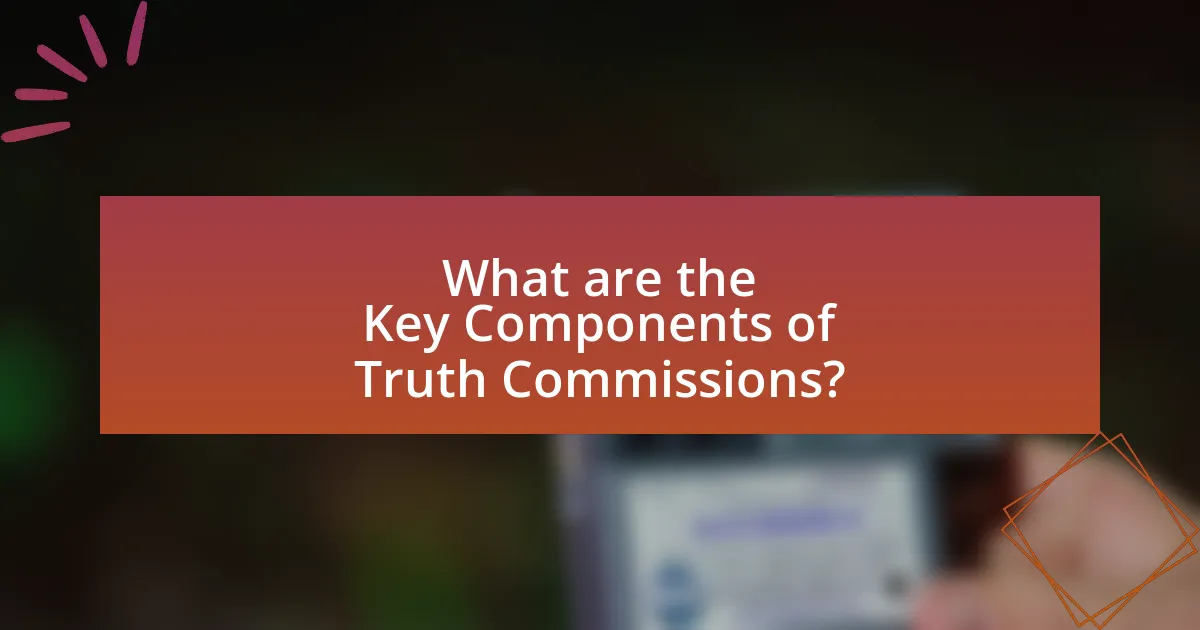
What are the Key Components of Truth Commissions?
The key components of truth commissions include mandate, composition, procedures, and reporting. The mandate defines the commission’s purpose, scope, and authority, often focusing on investigating human rights violations. Composition refers to the diverse membership of the commission, which typically includes legal experts, human rights advocates, and representatives from affected communities to ensure credibility and inclusivity. Procedures outline how the commission conducts investigations, gathers testimonies, and engages with victims, often emphasizing transparency and public participation. Finally, reporting involves the commission’s obligation to produce a final report that documents findings, provides recommendations for reparations, and promotes accountability, as seen in the South African Truth and Reconciliation Commission’s 1998 report, which played a crucial role in the country’s transition from apartheid.
What roles do various stakeholders play in Truth Commissions?
Various stakeholders in Truth Commissions play critical roles that influence the commission’s effectiveness and outcomes. Government representatives are responsible for establishing the commission’s mandate and providing necessary resources, while civil society organizations advocate for victims’ rights and ensure community engagement. Victims and witnesses contribute personal testimonies that are essential for uncovering the truth and fostering reconciliation. Additionally, international organizations may offer technical support and funding, enhancing the commission’s credibility and reach. For instance, the South African Truth and Reconciliation Commission involved diverse stakeholders, including the government, victims, and NGOs, which collectively facilitated a comprehensive approach to addressing past injustices.
How do government entities interact with Truth Commissions?
Government entities interact with Truth Commissions primarily by establishing them, providing resources, and facilitating their operations. For instance, in South Africa, the government created the Truth and Reconciliation Commission in 1995 to address human rights violations during apartheid, demonstrating a direct governmental role in initiating such commissions. Additionally, government entities often collaborate with Truth Commissions by supplying necessary documentation and access to witnesses, which is crucial for the commission’s investigative processes. This interaction is essential for ensuring transparency and accountability in post-conflict societies, as evidenced by the findings of the United Nations, which emphasize the importance of governmental support in the effectiveness of Truth Commissions.
What is the role of civil society in supporting Truth Commissions?
Civil society plays a crucial role in supporting Truth Commissions by facilitating community engagement, providing advocacy, and ensuring accountability. Organizations within civil society often mobilize public support for the commission’s work, helping to raise awareness about human rights violations and the importance of truth-telling in post-conflict societies. For instance, in South Africa, civil society groups were instrumental in promoting the Truth and Reconciliation Commission, which aimed to address the atrocities of apartheid. These groups not only gathered testimonies from victims but also pressured the government to comply with the commission’s recommendations, thereby reinforcing the legitimacy and effectiveness of the process.
What methodologies do Truth Commissions employ to ensure fairness?
Truth Commissions employ methodologies such as inclusive stakeholder engagement, transparent processes, and adherence to legal standards to ensure fairness. These commissions actively involve victims, perpetrators, and community members in their proceedings, allowing diverse perspectives to be heard, which fosters a sense of ownership and legitimacy. Transparency is maintained through public hearings and accessible documentation, enabling scrutiny and accountability. Additionally, adherence to legal standards ensures that the rights of all participants are protected, which is crucial for establishing trust in the commission’s findings. For instance, the South African Truth and Reconciliation Commission utilized these methodologies to address past injustices and promote national healing, demonstrating their effectiveness in achieving fairness.
How do Truth Commissions balance the need for truth with the need for justice?
Truth Commissions balance the need for truth with the need for justice by prioritizing truth-telling as a means to foster reconciliation while often recommending restorative justice measures rather than punitive ones. These commissions, such as South Africa’s Truth and Reconciliation Commission, focus on uncovering the facts of past human rights violations, which helps victims gain acknowledgment and closure. At the same time, they may offer amnesty to perpetrators who fully disclose their actions, thus promoting a form of justice that emphasizes healing over retribution. This approach aims to create a comprehensive historical record, which is essential for societal healing, while also addressing the victims’ needs for recognition and accountability.
What measures are taken to protect witnesses during the process?
Witness protection measures during the process of truth commissions include confidentiality, relocation, and legal safeguards. Truth commissions often implement strict confidentiality protocols to ensure that the identities of witnesses are not disclosed, thereby minimizing the risk of retaliation. Additionally, some witnesses may be offered relocation to a safe environment if their safety is threatened. Legal safeguards, such as immunity from prosecution for testimonies given, further encourage witnesses to come forward without fear of legal repercussions. These measures are crucial for fostering an environment where individuals feel secure in sharing their experiences, which is essential for the truth-seeking mission of these commissions.
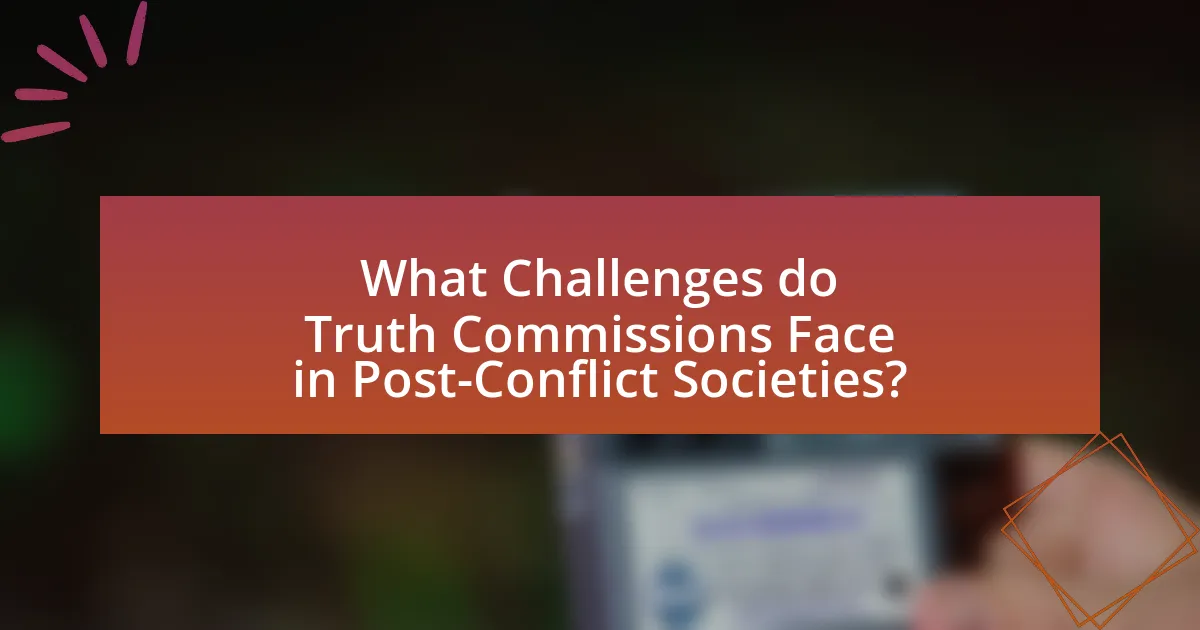
What Challenges do Truth Commissions Face in Post-Conflict Societies?
Truth commissions face several significant challenges in post-conflict societies, including lack of political will, limited resources, and societal divisions. Political will is often undermined by ongoing power struggles or resistance from those implicated in past abuses, which can hinder the commission’s ability to operate effectively. Limited resources, both financial and human, restrict the scope and depth of investigations, impacting the commission’s overall effectiveness. Additionally, societal divisions, stemming from ethnic or political tensions, can lead to distrust in the commission’s impartiality, making it difficult to gather testimonies and achieve reconciliation. For instance, in South Africa, the Truth and Reconciliation Commission encountered resistance from various political factions, which complicated its efforts to foster national unity.
What are the common criticisms of Truth Commissions?
Common criticisms of Truth Commissions include their perceived ineffectiveness in delivering justice, potential for selective memory, and the risk of undermining legal accountability. Critics argue that Truth Commissions often fail to hold perpetrators accountable for crimes, as they may prioritize reconciliation over prosecution. For instance, in South Africa, the Truth and Reconciliation Commission faced backlash for granting amnesty to individuals who confessed to human rights violations, leading to concerns about justice for victims. Additionally, the process can be seen as favoring certain narratives while marginalizing others, which can perpetuate divisions within society. This selective memory can hinder the comprehensive understanding of historical events, as seen in various commissions worldwide. Lastly, some argue that Truth Commissions may inadvertently legitimize the actions of those who committed atrocities by framing their actions within a narrative of national healing, thus complicating the pursuit of justice.
How do political influences affect the effectiveness of Truth Commissions?
Political influences significantly undermine the effectiveness of Truth Commissions by shaping their agendas, limiting their scope, and affecting public trust. When political entities exert control over the commission’s operations, they may prioritize narratives that align with their interests, thereby skewing the truth-seeking process. For instance, in South Africa, the Truth and Reconciliation Commission faced challenges due to political pressures that influenced the testimonies and the extent of accountability pursued, which ultimately affected its perceived legitimacy. Additionally, political actors may obstruct investigations or manipulate findings to protect their interests, as seen in various Latin American countries where military and political elites resisted full disclosure of human rights abuses. This manipulation can lead to a lack of comprehensive reporting and hinder the commission’s ability to foster reconciliation and healing within society.
What challenges arise in the implementation of recommendations made by Truth Commissions?
Challenges in the implementation of recommendations made by Truth Commissions include political resistance, lack of resources, and societal divisions. Political resistance often arises when government officials or influential groups oppose the findings or recommendations, fearing accountability or loss of power. For instance, in South Africa, the Truth and Reconciliation Commission faced significant challenges in implementing its recommendations due to pushback from political leaders who were reluctant to confront past injustices.
Additionally, a lack of resources can hinder the execution of recommendations, as financial and human capital are often limited in post-conflict settings. In countries like Guatemala, insufficient funding has impeded the establishment of reparations programs for victims of human rights abuses.
Finally, societal divisions can complicate the acceptance and implementation of recommendations, as communities may be polarized along ethnic or political lines. In Rwanda, the aftermath of the genocide created deep societal rifts that made it difficult to achieve consensus on the recommendations of the Truth and Reconciliation Commission. These challenges collectively undermine the effectiveness of Truth Commissions in fostering reconciliation and justice in post-conflict societies.
How can Truth Commissions adapt to overcome obstacles?
Truth Commissions can adapt to overcome obstacles by incorporating community engagement and utilizing technology for transparency and accessibility. Engaging local communities fosters trust and encourages participation, which is essential for gathering testimonies and ensuring diverse perspectives are represented. For instance, the South African Truth and Reconciliation Commission successfully involved various community stakeholders, which enhanced its legitimacy and effectiveness. Additionally, employing technology, such as online platforms for reporting and sharing findings, can increase transparency and reach marginalized populations, as seen in the use of digital tools by the Colombian Truth Commission to document experiences of victims. These adaptations are crucial for addressing challenges such as skepticism, limited resources, and political resistance.
What best practices can enhance the effectiveness of Truth Commissions?
Best practices that can enhance the effectiveness of Truth Commissions include ensuring broad public participation, maintaining independence from political influence, and providing adequate resources for operations. Broad public participation fosters trust and legitimacy, as seen in South Africa’s Truth and Reconciliation Commission, which engaged various community stakeholders. Independence from political influence is crucial; for instance, the Peruvian Truth and Reconciliation Commission operated with autonomy, allowing for impartial investigations. Adequate resources, both financial and human, are essential for thorough investigations and outreach, as demonstrated by the successful operations of the Sierra Leone Truth and Reconciliation Commission, which had sufficient funding and staffing to carry out its mandate effectively.
How can international support improve the outcomes of Truth Commissions?
International support can significantly enhance the outcomes of Truth Commissions by providing essential resources, expertise, and legitimacy. For instance, financial backing from international organizations can ensure that Truth Commissions have the necessary funding to conduct thorough investigations and outreach efforts, as seen in the case of South Africa’s Truth and Reconciliation Commission, which received substantial international funding that facilitated its operations. Additionally, the involvement of international legal experts can improve the investigative processes and ensure adherence to human rights standards, as demonstrated by the support provided to the Sierra Leone Truth and Reconciliation Commission by the United Nations. Furthermore, international endorsement can bolster the credibility of Truth Commissions, encouraging public participation and cooperation from various stakeholders, which is crucial for gathering comprehensive testimonies and fostering national reconciliation.
What are the Practical Implications of Truth Commissions for Future Societies?
Truth commissions have significant practical implications for future societies, primarily by fostering reconciliation, establishing historical narratives, and promoting accountability. These commissions facilitate dialogue among conflicting parties, which can lead to social healing and the rebuilding of trust within communities. For instance, the South African Truth and Reconciliation Commission, established in 1995, played a crucial role in addressing the atrocities of apartheid, allowing victims to share their experiences and perpetrators to confess their crimes, thereby contributing to national unity.
Additionally, truth commissions help document human rights violations, creating an official record that can serve as a reference for future generations. This documentation is vital for educating society about past injustices, preventing the recurrence of such events. The report from the Chilean National Commission on Truth and Reconciliation, published in 1991, provided a comprehensive account of human rights abuses during the Pinochet regime, influencing public discourse and policy reforms.
Moreover, truth commissions can enhance legal accountability by recommending prosecutions for those responsible for serious crimes. The recommendations from the El Salvador Truth Commission, established in 1992, led to significant legal reforms and the eventual prosecution of some military officials, demonstrating the potential for truth commissions to influence judicial processes.
In summary, truth commissions play a crucial role in shaping future societies by promoting reconciliation, documenting history, and fostering accountability, as evidenced by various historical examples.
How can lessons learned from Truth Commissions inform future conflict resolution efforts?
Lessons learned from Truth Commissions can significantly inform future conflict resolution efforts by providing frameworks for accountability, reconciliation, and societal healing. Truth Commissions, such as South Africa’s Truth and Reconciliation Commission, have demonstrated that acknowledging past atrocities and facilitating dialogue among conflicting parties can foster trust and understanding. For instance, the commission’s approach to restorative justice emphasized the importance of victims’ narratives, which helped to validate their experiences and promote collective healing. This model illustrates that integrating victim testimonies and promoting inclusive dialogue can enhance the legitimacy of conflict resolution processes. Furthermore, the findings from various Truth Commissions indicate that transparency in addressing human rights violations can deter future conflicts by establishing a precedent for accountability. Thus, the lessons from these commissions underscore the necessity of incorporating victim-centered approaches and transparency in future conflict resolution strategies to build sustainable peace.
What role do Truth Commissions play in preventing future atrocities?
Truth Commissions play a crucial role in preventing future atrocities by promoting accountability, fostering reconciliation, and providing a platform for victims’ voices. By investigating past human rights violations, these commissions establish a historical record that can deter future abuses. For instance, the South African Truth and Reconciliation Commission documented apartheid-era crimes, which helped to create a societal consensus against such actions and encouraged legal reforms. Additionally, by acknowledging victims’ experiences, Truth Commissions contribute to healing and social cohesion, reducing the likelihood of conflict resurgence. The establishment of legal frameworks and public awareness generated by these commissions serves as a deterrent against potential perpetrators, reinforcing the rule of law and human rights standards.
